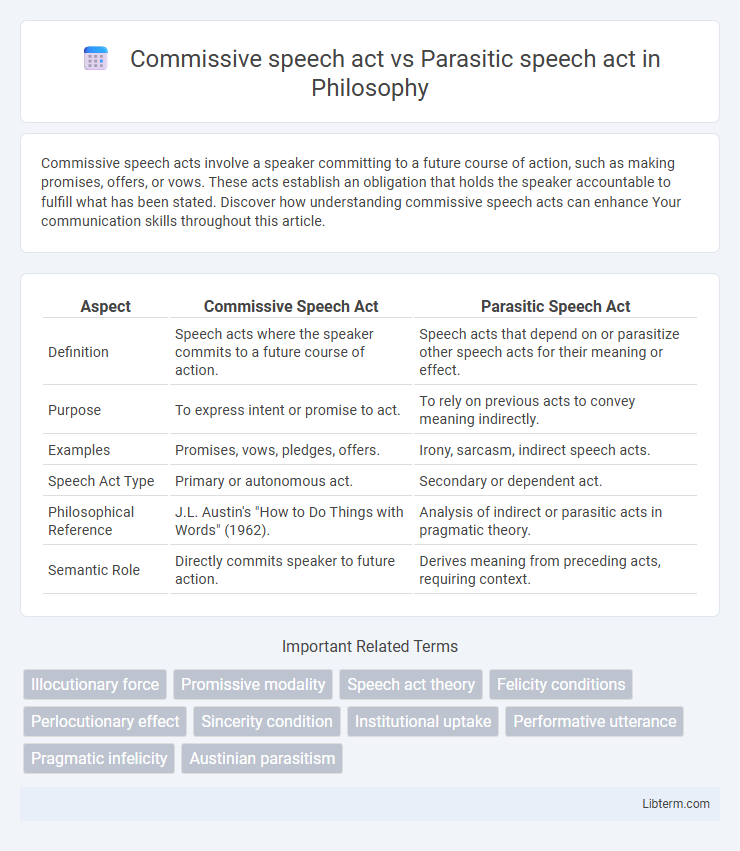Commissive speech acts involve a speaker committing to a future course of action, such as making promises, offers, or vows. These acts establish an obligation that holds the speaker accountable to fulfill what has been stated. Discover how understanding commissive speech acts can enhance Your communication skills throughout this article.
Table of Comparison
| Aspect | Commissive Speech Act | Parasitic Speech Act |
|---|---|---|
| Definition | Speech acts where the speaker commits to a future course of action. | Speech acts that depend on or parasitize other speech acts for their meaning or effect. |
| Purpose | To express intent or promise to act. | To rely on previous acts to convey meaning indirectly. |
| Examples | Promises, vows, pledges, offers. | Irony, sarcasm, indirect speech acts. |
| Speech Act Type | Primary or autonomous act. | Secondary or dependent act. |
| Philosophical Reference | J.L. Austin's "How to Do Things with Words" (1962). | Analysis of indirect or parasitic acts in pragmatic theory. |
| Semantic Role | Directly commits speaker to future action. | Derives meaning from preceding acts, requiring context. |
Introduction to Speech Acts in Linguistics
Commissive speech acts involve a speaker committing to a future action, such as promising or offering, which directly affects the speaker's obligations. Parasitic speech acts, by contrast, rely on an original speech act to gain meaning or force, often functioning as secondary or dependent utterances within discourse. In linguistics, understanding these distinctions enhances comprehension of how speakers manage intentions and social interactions through language.
Defining Commissive Speech Acts
Commissive speech acts are utterances in which the speaker commits to a future course of action, such as promising, offering, or guaranteeing. These acts establish an obligation for the speaker to fulfill the stated intention, creating a binding social contract through language. In contrast, parasitic speech acts depend on a host speech act for their meaning and typically modify or comment on the primary act without committing to additional actions.
Understanding Parasitic Speech Acts
Parasitic speech acts occur when a speaker's utterance depends on or exploits another speech act to achieve its illocutionary force, often embedding indirect meanings that are not overtly stated. Unlike commissive speech acts, which express a speaker's commitment to a future action, parasitic speech acts gain their performative power by attaching to or parasitizing other speech acts, complicating the interpretation process. Understanding parasitic speech acts involves analyzing the interplay between primary and secondary acts to reveal hidden intentions and pragmatic dependencies in communication.
Key Features of Commissive Speech Acts
Commissive speech acts primarily involve the speaker committing to a future course of action, such as promises, vows, or offers, which establish an obligation to carry out the stated action. These acts are characterized by the speaker's intent to bind themselves, creating expectations for both the speaker and the listener regarding follow-through. Unlike parasitic speech acts, which depend on existing speech acts to convey meaning, commissive speech acts stand independently as explicit commitments to perform specific actions.
Characteristics of Parasitic Speech Acts
Parasitic speech acts rely on previously established speech acts and derive meaning through dependency rather than original intent, often functioning as secondary or supportive communicative moves. They lack independent illocutionary force and depend on the context and content of primary speech acts to achieve their purpose. Characteristics include dependency on prior utterances, absence of standalone communicative effect, and a role in reinforcing or modifying the main speech act's function.
Differences Between Commissive and Parasitic Speech Acts
Commissive speech acts commit the speaker to a future course of action, such as promises, offers, or vows, emphasizing the speaker's intentional obligation. Parasitic speech acts, by contrast, depend on or parasitize other speech acts for their meaning or effect, lacking independent illocutionary force and often serving to reinforce or modify primary speech acts. The key difference lies in commissives actively bind the speaker to action, while parasitic acts function indirectly through their reliance on other utterances.
Functions and Contexts: Commissive vs. Parasitic
Commissive speech acts function to commit the speaker to a future course of action, typically found in promises, offers, and vows within formal or interpersonal communication contexts. Parasitic speech acts, conversely, derive their meaning and force from their dependence on prior utterances, often appearing in conversational repairs, clarifications, or echoic remarks. The distinct function of commissives lies in expressing intentions, whereas parasitic acts facilitate dialogue coherence by building on previous discourse contexts.
Examples of Commissive Speech Acts
Commissive speech acts commit the speaker to a future course of action, such as promising, offering, or volunteering, exemplified by statements like "I will finish the report by tomorrow" or "I promise to help you move." These acts explicitly bind the speaker to carry out a particular action, distinguishing them from parasitic speech acts, which rely on the context of other speech acts without committing the speaker. Examples highlight the proactive engagement of the speaker, showcasing intentions and guarantees central to pragmatics and speech act theory.
Examples of Parasitic Speech Acts
Parasitic speech acts occur when a speaker exploits the context or structure of a previous speech act to achieve an unintended effect, such as using a question rhetorically or making a statement dependent on another's commitment. Examples include rhetorical questions, where the speaker does not seek an actual answer but reinforces a point, and tag questions that solicit agreement without genuine inquiry. These acts contrast with commissive speech acts, which explicitly commit the speaker to a future action, like promising or vowing.
Implications for Communication and Pragmatics
Commissive speech acts commit a speaker to a future action, shaping expectations and fostering trust in interpersonal and professional communication. Parasitic speech acts rely on and exploit the context or prior speech acts, often causing ambiguity or misinterpretation in pragmatic analysis. Understanding these distinctions enhances effective communication strategies and informs pragmatic theory by clarifying speaker intent and context sensitivity.
Commissive speech act Infographic

 libterm.com
libterm.com